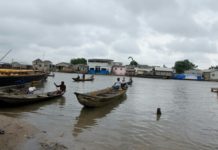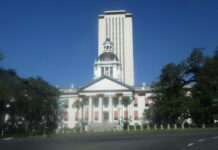Photo Credit: Global Diaspora News (www.GlobalDiasporaNews.com).
GENEVA, April 12 â Over 140 experts from 65 countries will meet next week in Riga, Latvia, to draft the outline of the Intergovernmental Panel on Climate Change (IPCC)âs Special Report on Climate Change and Cities. The scoping meeting, scheduled to run from 16 to 19 April, is the first step in production of the report and the first scoping meeting of the seventh assessment cycle. The draft outline developed by experts attending the scoping meeting in Riga will be considered by the Panel at its next Session at the end of July.
The Special
Report on Climate Change and Cities is expected to be released in early 2027
and will be the only special report the IPCC produces in the seventh assessment
cycle. It is being developed under the joint scientific leadership of Working Groups I, II, and III, with support by the Working Group
II Technical Support Unit.
The Panel has
already decided to produce the Special Report on Climate Change and Cities and
the Methodology Report on Short-lived Climate Forcers during the previous,
sixth assessment cycle.
Meanwhile,
the Seventh Assessment Report will comprise the three Working Group contributions
and a Synthesis Report which is to be prepared by late 2029. The three Working
Group contributions will cover the physical science basis of climate change;
its impacts, vulnerabilities and adaptation; as well as mitigation of climate
change.
The IPCC
will also prepare a Methodology Report on Carbon Dioxide Removal Technologies,
Carbon Capture Utilisation and Storage, and will revise the 1994 IPCC Technical
Guidelines on impacts and adaptation as well as adaptation indicators, metrics
and guidelines.
Media
briefing
On 15 April 2024, IPCC Chair Jim Skea, IPCC Bureau
Members, and representatives from the Latvian government will give a media
briefing to local media in Riga at 2 p.m. local time. The briefing will take
place at the Radisson Blu Latvija
Hotel.
Outreach
On the
margins of the Scoping Meeting, the IPCC will hold several outreach events.
On 17 April
at noon local time, the IPCC Chair accompanied by several IPCC Bureau Members,
will meet and brief members of the Latvian parliament, including those from the Parliamentary Committee on Sustainable Development.
That same evening from 6.30 local time several IPCC
experts will be taking part in an event organized by the CLIMAAX research project
at the Raddison Blu Latvija Hotel.
On 19 April, IPCC experts will
address and discuss climate change-related issues with the members of the Riga
City Council, academia, experts, architects, and other audiences at an event
hosted by the Riga City Council from 14.00 to 17.00.
For more information please contact:
IPCC Press Office, Email: ipcc-media@wmo.int
Andrej Mahecic, +41 79 704 2459 or Werani Zabula, +41 22 730 8120
Notes for
editors
What is the IPCC?
The
Intergovernmental Panel on Climate Change (IPCC) is the UN body for assessing
the science related to climate change. It was established by the United Nations
Environment Programme (UNEP) and the World Meteorological Organization (WMO) in
1988 to provide political leaders with periodic scientific assessments
concerning climate change, its implications and risks, as well as to put
forward adaptation and mitigation strategies. In the same year the UN General
Assembly endorsed the action by the WMO and UNEP in jointly establishing the
IPCC. It has 195 member states.
Thousands
of people from all over the world contribute to the work of the IPCC. For the
assessment reports, experts volunteer their time as IPCC authors to assess the
thousands of scientific papers published each year to provide a comprehensive
summary of what is known about the drivers of climate change, its impacts and
future risks, and how adaptation and mitigation can reduce those risks.
The
IPCC has three working groups: Working Group I,
dealing with the physical science basis of climate change; Working Group II,
dealing with impacts, adaptation and vulnerability; and Working Group III,
dealing with the mitigation of climate change. It also has a Task Force on National Greenhouse Gas
Inventories that develops methodologies for measuring
emissions and removals.
IPCC
assessments provide governments, at all levels, with scientific information
that they can use to develop climate policies. IPCC assessments are a key input
into the international negotiations to tackle climate change. IPCC reports are
drafted and reviewed in several stages, thus guaranteeing objectivity and
transparency.
About the Seventh Assessment
Cycle
Comprehensive
scientific assessment reports are published every 5 to 7 years. The IPCC is currently
in its seventh assessment cycle, which formally began in July 2023 with the elections
of the new IPCC and Taskforce Bureaus at the IPCCâs Plenary Session in Nairobi.
IPCCâs latest
report, the Sixth Assessment Report, was completed in March 2023 with
the release of its Synthesis Report, which provides direct scientific input to the
first global stocktake process under the United Nations Framework Convention on
Climate Change at COP28 in Dubai.
The
Sixth Assessment Report comprises three Working Group contributions and a
Synthesis Report. The Working Group I contribution Climate Change 2021: the Physical
Science Basis was released on 9 August
2021. The Working Group II contribution, Climate Change 2022: Impacts,
Adaptation and Vulnerability,
was released on 28 February 2022. The Working Group III contribution, Climate Change 2022: Mitigation of
Climate Change, was released on 4 April
2022 and the Synthesis Report on 20 March 2023. The Synthesis Report to the Sixth Assessment Report, distils and
integrates the findings of the three Working Group assessments as well as the
three Special Reports released in 2018 and 2019.
The
special reports were on Global Warming of 1.5°C (October
2018.), Climate Change and Land (August 2019)
and, the ocean and cryosphere in a changing climate
(September 2019).
For
more information visit www.ipcc.ch.
The
website includes outreach materials
including videos about the IPCC and video recordings from outreach events conducted as webinars or
live-streamed events.
Most videos published by the IPCC can be found on our YouTube channel.
Source of original article: IPCC (www.ipcc.ch).
The content of this article does not necessarily reflect the views or opinion of Global Diaspora News (www.GlobalDiasporaNews.com).
To submit your press release: (https://www.GlobalDiasporaNews.com/pr).
To advertise on Global Diaspora News: (www.GlobalDiasporaNews.com/ads).
Sign up to Global Diaspora News newsletter: (https://www.GlobalDiasporaNews.com/newsletter/) to start receiving updates and opportunities directly in your email inbox for free.
































